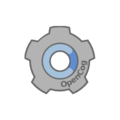OpenCog
 Open Source Artificial Intelligence | |
| Original author(s) | OpenCog Developers |
|---|---|
| Developer(s) | OpenCog Foundation |
| Initial release | 21 January 2008[1] |
| Development status | Active |
| Written in | C++, Python, Scheme |
| Platform | GNU/Linux |
| Type | Artificial general intelligence |
| License | GNU AGPLv3 |
| Website | opencog.org |
OpenCog is a project that aims to build an open source artificial intelligence framework. OpenCog Prime[2] is a cognitive architecture for robot and virtual embodied cognition that defines a set of interacting components designed to give rise to human-equivalent artificial general intelligence (AGI) as an emergent phenomenon of the whole system. OpenCog Prime's design is primarily the work of Ben Goertzel while the OpenCog framework is intended as a generic framework for broad-based AGI research. Research utilizing OpenCog has been published in journals and presented at conferences and workshops including the annual Conference on Artificial General Intelligence. OpenCog is released under the terms of the Affero General Public License (AGPL).
Origin
OpenCog was originally based on the release in 2008 of the source code of the proprietary "Novamente Cognition Engine" (NCE) of Novamente LLC. The original NCE code is discussed in the PLN book (ref below). Ongoing development of OpenCog is supported by Artificial General Intelligence Research Institute (AGIRI), the Google Summer of Code project, and others.
Components
OpenCog consists of:
- An API to manipulate an extended hypergraph of terms and relationships, dubbed the AtomSpace.
- An implementation of a probabilistic reasoning engine based on probabilistic logic networks (PLN).
- A probabilistic genetic program evolver called Meta-Optimizing Semantic Evolutionary Search, or MOSES, originally developed by Moshe Looks who is now employed at Google.
- An attention allocation system based on economic theory, ECAN.
- An embodiment system for interaction and learning within virtual worlds based in part on OpenPsi and Unity3D.
- A natural language input system consisting of Link Grammar and RelEx, both of which employ AtomSpace-like representations for semantic and syntactic relations.
- A natural language generation system called SegSim, with implementations NLGen and NLGen2.
Relation to Singularity Institute
In 2008, the Singularity Institute for Artificial Intelligence (SIAI) sponsored OpenCog, resulting in a part-time post-doc Joel Pitt and a full-time system engineer. Many contributions from the open source community have been made since OpenCog's involvement in the Google Summer of Code in 2008 and 2009. Currently the SIAI no longer supports OpenCog.[3] Today, OpenCog receives funding and support from several sources including the Hong Kong government, Hong Kong Polytechnic and the Jeffrey Epstein VI Foundation.[4]
See also
Sources
- Hart, D; B Goertzel (2008). "OpenCog: A Software Framework for Integrative Artificial General Intelligence". Proceedings of the First AGI Conference. Gbooks
- Goertzel, B., Iklé, M., Goertzel, I.F., Heljakka, A. Probabilistic Logic Networks, A Comprehensive Framework for Uncertain Inference, Springer, 2009, VIII, 336 p., Hardcover ISBN 978-0-387-76871-7
References
- ↑ "OpenCog Release". 21 January 2008. Retrieved 21 January 2008.
- ↑ "OpenCog Prime Wiki and Book".
- ↑ Ben Goertzel (2010-10-29). "The Singularity Institute's Scary Idea (and Why I Don't Buy It)". The Multiverse According to Ben. Retrieved 2011-06-24.
- ↑ "Science Funder Jeffrey Epstein Launches Radical Emotional Software". Forbes. Oct 2, 2013.
External links
- Official website
- OpenCog Wiki
- 2011: OpenCog GoogleTechTalks on YouTube
- 2011: Architectures Part I GoogleTechTalks on YouTube
- General Intelligence: Now Is the Time 2007 GoogleTechTalks on YouTube
- CogPrime: An Integrative Architecture for Embodied Artificial General Intelligence
- CyberTech NewsArchive copy at the Wayback Machine
- OpenCog: An Open Source Software Framework & A Design & Vision for Advanced AGI. Given at Monash University Australia, Sept 2011. Adam Ford on YouTube
- Video introduction to OpenCog by Ben Goertzel. Ben speaks on OpenCog in Tai Po, Hong Kong, Dec 2011. Adam Ford on YouTube
- Ben Goertzel - the future of AGI - Open Cog development in Asia Adam Ford on YouTube